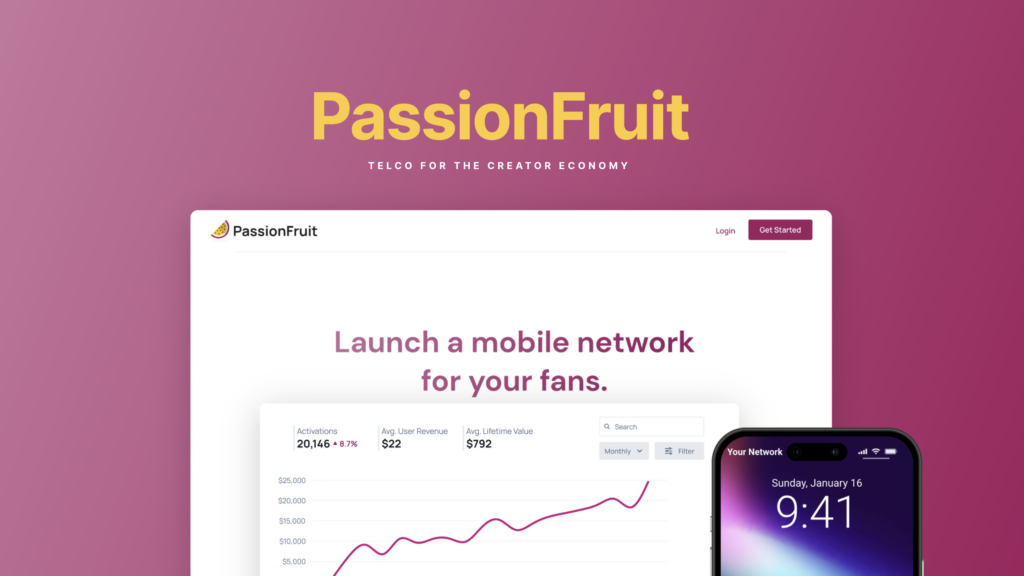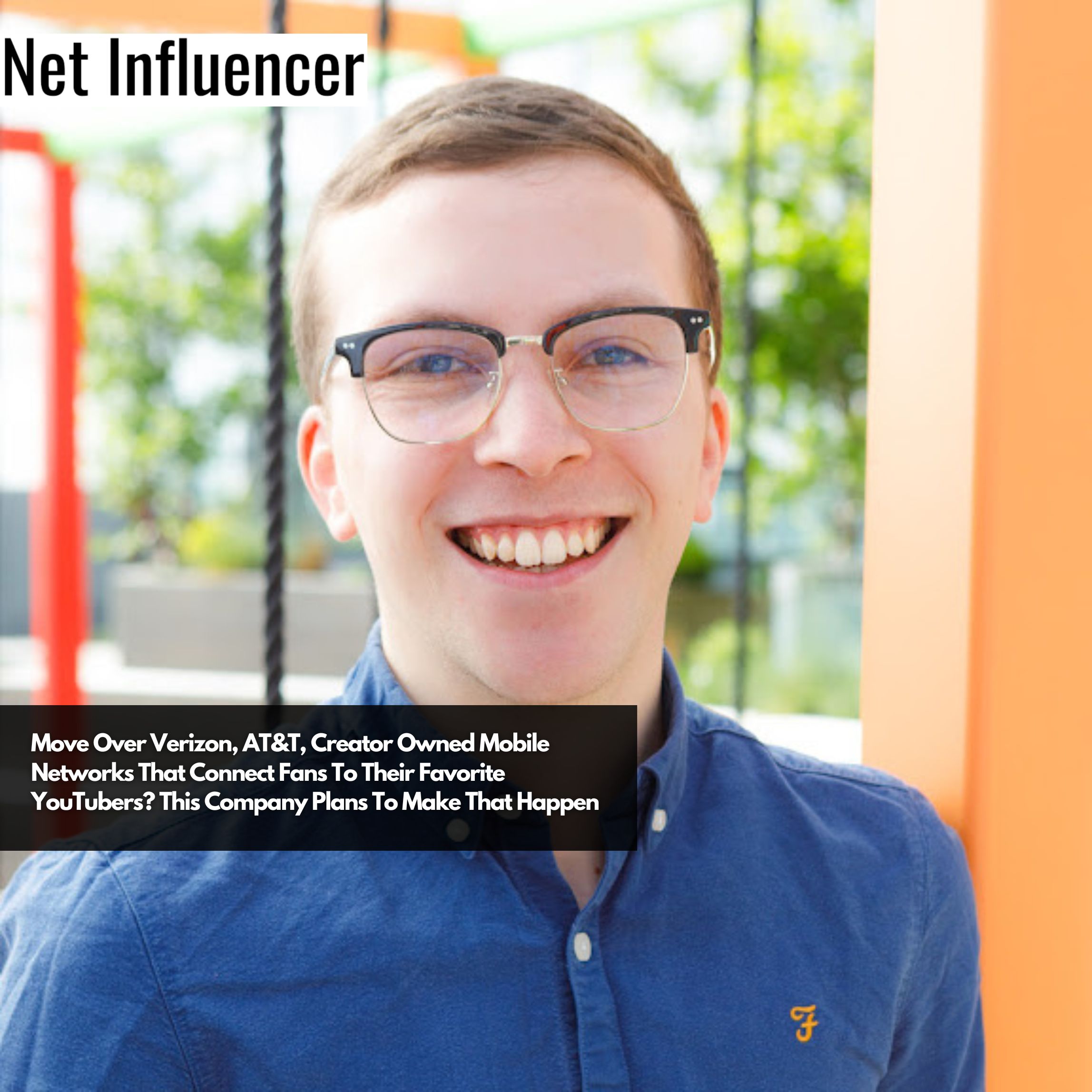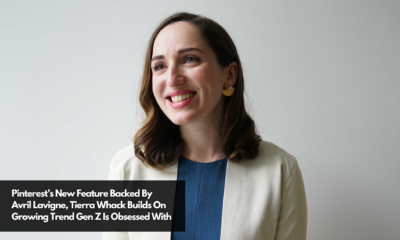Technology
Move Over Verizon, AT&T, Creator Owned Mobile Networks That Connect Fans To Their Favorite YouTubers? This Company Plans To Make That Happen
Founded in 2024, PassionFruit is a startup aiming to be the leading platform for creators to launch their own mobile networks. Co-founded by Matthew Hewston, along with David McElligott and YouTuber Dan Malone, the company wants creators with large fan bases to effectively become the brand and distribution channel for wireless services, offering exclusive content and perks to give fans a new way to connect with their favorite creators through mobile plans with unique experiences.
“Our goal is to be the world’s leading platform for launching creator-led mobile networks,” said Matthew Hewston, who is chief executive officer of the company. “And our vision is to improve the lives of the creators that we work with, get a really exciting venture that they can launch and a new way for them to kind of bring value to their fans.”

PassionFruit is tapping into the rising “creator economy” where social media personalities have huge followings and are increasingly leveraging that audience to launch consumer product brands, from beverages to clothing lines. The three-person founding team at PassionFruit believes mobile networks or more precisely, mobile virtual networks, could be a lucrative new frontier.
A mobile virtual network operator (MVNO) is a wireless communications services provider that does not own the wireless network infrastructure over which it provides services to its customers. Instead, an MVNO enters into a business agreement with a mobile network operator like T-Mobile or AT&T in the US to obtain bulk access to network services at wholesale rates, then sets retail prices independently. Some well-known MVNOs include Virgin Mobile, Boost Mobile, and Cricket Wireless in the United States, and Lycamobile and giffgaff in the United Kingdom.
“One space we got really interested in is the whole world of mobile [virtual] networks, specifically with eSIM,” Hewston said, referring to the digital SIM cards that allow people to switch wireless carriers remotely. “If you think about our phone, it changes a lot every year or every couple of years. But our mobile networks have pretty much remained the same for the past couple decades.”
Hewston said mobile carriers face challenges with how they market themselves and differentiate from rivals. “It’s been a space where margin has been eroded and there’s been real challenges for how they grow their businesses,” he said.

The idea is for creators to effectively become the brand and distribution channel for a wireless service, potentially offering unique content or perks. “If you think about any creator, we would have a larger network where they get recurring revenue, a new way to build a brand, and a new way to connect with their audience as well,” Hewston said. “And their audience gets their mobile network benefits, their connectivity and so on. But also they get benefits tied [to] that favorite creator. So that could be exclusive content, it could be a community, or it could be additional perks to tie that particular talent.”
Creator Origins, Creator Focus
PassionFruit was born out of co-founder Dan Malone’s experience launching his own YouTube channel during the Covid-19 pandemic to provide financial advice. “One problem he had as a creator was he had an inbox full of opportunities, but the opportunities were often impersonal; they were volatile and not really linked to actually bringing value to him as a brand or him as a creator,” Hewston said. “So we started looking for some interesting ways we can help creators have more long term financial security.”
The company is drawing inspiration from the creator-led consumer packaged goods brands that have emerged in recent years, such as Feastables by YouTuber MrBeast and Prime energy drink by YouTubers KSI and Logan Paul. “Really cool things are happening in the CPG space with creators using their audience as their form of distribution, using their brands as a way to differentiate,” Hewston said.
Hewston outlined the process of how PassionFruit partners with creators to develop their own mobile networks.
“The first thing we want to do is meet with a creator, understand what their ambitions are as a creator,” he said. “I think it’s very important for us to work with those who have real ambitions for growth and have a real connection and loyalty with their fan base.”
From there, PassionFruit collaborates with the creator on branding and envisioning what the mobile network would look like, including developing network branding, SIM card designs and more. “If they have a developed brand, we send with those brand assets to build together what a mobile network is going to look like,” Hewston said.
The company then analyzes the creator’s audience data to estimate the revenue potential. “We look at their monthly reach. We look at the addressable market. We assume some conversion rates on that. And then we can give them a sense of what the actual dollar opportunity is for them,” he said.
PassionFruit typically targets creators with at least 1 million recurring monthly views on longer-form video platforms like YouTube or Twitch. “We like to see at least 1 million long form recurring views, simply because it’s going to be a stickier audience,” Hewston said. “And within that audience itself we look for those who have a high level of fandom – are people engaging with your content, are they buying merch from you already?”
A key part of the strategy is developing unique benefits and experiences that creators can offer their fans who subscribe to the mobile network. “This isn’t just a branding play but there are actually really cool benefits you can bring on to your network,” Hewston said. “So, for example, could you imagine if a subscriber is on the network, you know, to set up a show for you to call them and they can join you for a game of FIFA or Call of Duty, or they get access to subscriber only events, or they get discounts on particular merch lines or exclusive live streams.”
Hewston touted the recurring revenue model and potential for high customer retention as major advantages over other creator monetization schemes like merchandise sales.
“Sustainability is what it’s all about,” he said. “I think it’s great seeing creators do merch sales for hoodies or mugs, but there’s only so many hoodies or mugs a fan might buy – those tend to be a one-off sale. For us, the recurring nature of mobile networks makes [things] really, really interesting. As well as the potential retention rate of [a loyal fan base].”
Hewston believes mobile networks represent an attractive monetization avenue for creators due to the fundamentals of the telecommunications business model.
“Part of our secret sauce is the value of mobile networks,” he said. “What makes mobile networks really interesting is the proposition that there’s a real sense of lifetime value with a subscriber.”
He noted that the average customer lifetime value for a wireless subscriber is around 36 months. “For me, I’ve been with the same network since I was 14. So there is a real opportunity here – when you get a subscriber on the network, there is really good long-term recurring revenue coming in.”
Additionally, Hewston sees an enormous potential market for creator-led mobile networks given how many people already pay for wireless service monthly.
“If you think about telco and mobile networks, everybody’s paying $20, $30 a month for the network anyway,” he said. “So we believe you might as well pay that instead of to a network operator that you may not think too fondly of. [You can] pay that to your favorite creator and get these amazing additional benefits as well.”
By tapping into the recurring revenue streams and broad consumer demand associated with wireless services, PassionFruit believes it can unlock a new monetization model for digital creators beyond traditional avenues like merchandise or sponsorships. The company is betting fans will be willing to switch their mobile service to a creator-branded offering, especially if it comes with special perks and experiences.
Bringing the creator mobile network concept to market presents some unique challenges for Passionfruit, operating at the intersection of the talent and telecommunications industries.
Bringing Traditional Telecoms into the Creator Economy
“What’s really unique about what we’re doing is we have our feet in two very different worlds,” Hewston said. “One is a world of talent and creators and talent agencies, who have their ways of working and their norms. On the other side of the business is working with those in the telco space who tend to be a bit more traditional.”
He explained PassionFruit has to act as a translator of sorts, selling the creative talent opportunity to wireless carriers and vice versa in pitching the telco business model to influencers and their representatives.
“We’re translating the opportunity to telco as to why talent is really exciting, and translating to creators why telco is a really exciting space,” Hewston said. “For us it’s [about getting] different advisors onboard, getting different mentors on both sides of the coin to support us in that kind of work of making this make sense for both parts of our business.”
Despite the hurdles, Hewston sees straddling two very different audiences and industries as an exciting proposition for PassionFruit.
“It’s really exciting to have two very different audiences that we’re the go-between of,” he said.
Promising Early Conversations
As PassionFruit ramps up operations, Hewston said the startup has been encouraged by the initial reception from both telecommunications partners and creator talent.
“We’ve just got going in the last number of months but it’s been all go,” he said. “We are seeing some amazing interest from telco partners who were really excited by the opportunity creators have because it’s a very untapped and new space for them.”
Hewston noted that while telecom executives may not be familiar with influencer culture themselves, they see the potential when their own kids and grandkids are avid viewers of creator content on YouTube and other platforms.
On the creator side, Hewston said the mobile network pitch has piqued interest as “a very much untapped space for them” in terms of potential monetization.
The current focus is closing an angel funding round, with 3-4 investors already committed, according to Hewston. PassionFruit is also onboarding its first wave of 4-5 creators across different verticals.
“On the telco side we [are working with our] key partners on the connectivity perspective – those in the UK and those in the US [who] are going to help us get off the ground,” Hewston said, explaining that PassionFruit doesn’t build the actual network infrastructure itself but rather leverages existing carrier networks.
“Our key goal is to finish off that angel round in the coming days. And, that would allow us to have some launch dates in the coming, 2 or 3 months. And that would get us in the market and really get the ball rolling,” he said.
Despite being still in its earliest stages, Hewston exuded confidence about PassionFruit’s unique value proposition at the intersection of creators and telcos.
“We have some really cool agency partners and really great talent partners who believe a lot on what this can do for them as a business,” he said. “And [we’re] really excited to see what they do on our side, too.”
Looking ahead, Hewston sees PassionFruit operating in the vanguard of a broader shift as more creators move to establish enduring businesses and intellectual property rather than relying solely on episodic brand partnerships.
“The whole space of creators launching their own brands is the wave we’re obviously riding and the one that we’re most excited about,” Hewston said. “The problem this all arose from was from Dan, my co-founder’s experience of having to promote other brands and other partnerships that are very short term.”
He believes there is a growing imperative for influencers to develop sustainable revenue streams and assets that can appreciate in value over time.
“I think it’s really cool to see creators thinking more long term about how they can create a revenue stream, that might outlive them as a brand and outlive them in terms of, just what they’re doing on YouTube and really thinking about being more than just a creator but being a business owner as well,” Hewston said. “And I think that’s a really very interesting space.”
While Hewston acknowledges pioneers like MrBeast and the founders of Prime Hydration have already made strides in the space, he argues the creator-as-entrepreneur model needs to go more mainstream.
“We’ve seen obviously the big players like Mr. Beast and the guys at Prime Drinks, really blaze that trail but we think it’s time for creators of all shapes and sizes to jump on that wave,” he said. “Because, that’s really how we make this more of a long term thing and how we can really bring the most value, to them as creators, but also to their fan base as well.”



















